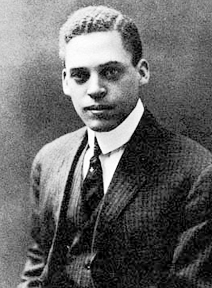Celebrating “The Black Apollo of Science” Ernest Everett Just
Just was born in South Carolina to parents, Charles Frazier Just Jr., a dock builder, and Mary Matthews, a teacher. Just’s father died when he was four years old due to his chronic alcoholism, leaving him, his younger sister and brother in the hands of his mother, who provided for the family as best as she could. The town Marysville on James Island in Charleston, where Matthews worked during the summers, is named in her honor due to her efforts persuading blacks to move there in pursuit of a more prosperous future.
When Just was thirteen years old, Matthews made the decision to move the family North to give them a better education. In 1900, Just started high school at the Kimball Hall Academy in New Hampshire. After graduating high school three years later, Just enrolled at Dartmouth College, where he fostered his devout passion for biology after reading a paper on fertilization and egg development. During his years at Dartmouth he was one of the most decorated students. His freshmen year he earned the highest grades in Greek language classes and was acknowledged as the Rufus Choate Scholar for two years, an honor given to students in the top five percent of their class. In 1907, Just was elected to Phi Beta Kappa (the highest honor society in the U.S.), graduated as the only magna cum laude student, and achieved honors in botany, sociology, and history. Just was the only black student to graduate in his class and won almost every single award for his year.
After graduating college, Just went on to teach rhetoric and English at Howard University. By 1909, Just was teaching biology, his beloved subject, and became the head of the Department of Zoology in 1912. During his time at Howard, Just established Omega Psi Phi in 1911, the first fraternity on the campus. In the summer of 1912, Just was invited to the Marine Biological Laboratory, in Woods Hole, Massachusetts, where he made shocking advancements in the field of fertilization of marine invertebrates. Just’s studies determined the breeding habits of annelids, such as marine worms and sea urchins, and his ability to make marine embryos develop normally impressed many of his peers. As a researcher, Just was called a “genius in the design of experiments.” For the next twenty years, Just would revolutionize the field of microbiology at this laboratory and would be called the first ecological developmental biologist.
In 1915, Just left Howard University to study at the University of Chicago, where he garnered national attention for being a pioneering black scientist. On February 12, 1915, Just won the NAACP’s Spingarn Medal, given annually to the highest achieving African American. In June 1916, Just earned his PhD in Zoology from the University of Chicago.
From 1920 to 1931, Just was a Julius Rosenwald fellow in biology. Although Just achieved much success in the U.S., racism and segregation was preventing him from reaching his full potential. With the support of the Rosenwald fellowship, Just moved to Naples, Italy in 1929 to conduct research at Anton Dohrn, a highly respected zoology research facility. After producing remarkable research at there, he received admission into the Kaiser Wilhelm Institute in Berlin-Dahlem, Germany, where Nobel Prize-winning research was conducted. While conducting research, Just published two books, Basic Methods for Experiments on Eggs of Marine Animals (1939) and The Biology of Cell Surface (1939) and over seventy research papers. Just moved to France to finish his research once World War II began.
During World War II, Just was warned to leave France because of the impending invasion from Nazi Germany, but he stubbornly remained to complete his research. As a consequence, Just was captured and put into a Nazi prisoner camp. In September of 1940, the U.S. State Department rescued him. The months Just spent inside the camp adversely affected his health and, since he was diagnosed shortly after his release with pancreatic cancer, contributed to his succumbing to the disease on October 27, 1941.
Just is remembered today as one of the most famous biologists who transcended the barriers faced by early twentieth century blacks scholars in the U.S. In 1983, Kenneth R. Manning, a professor at the Massachusetts Institute of Technology wrote the book, Black Apollo of Science: The Life of Everett Just, which received the 1983 Pfizer Award and was a finalist for the 1984 Pulitzer Prize. Today, Just is remembered annually at the Ernest E. Just Symposium at the Medical University of South Carolina, which encourages students of color in S.T.E.M. fields. His work will always be a symbol of what dedication and hard work can achieve for students worldwide.

